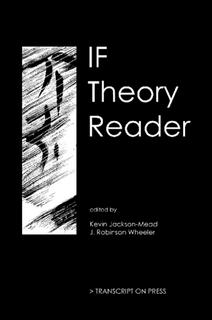Almost a decade after the project began, the IF Theory Reader is finally here, thanks to the hard work of editors Kevin Jackson-Mead and J. Robinson Wheeler. The book has been published by Transcript On Press and has made it out in time for PAX-East, where Kevin’s group The People’s Republic of Interactive Fiction will be hosting a hospitality suite.
There are 438 pages in this book, which can be downloaded as a PDF for free or purchased as a paperback for a mere $13.26.
My own contribution, “Toward a Theory of Interactive Fiction,” has a first page which (except for the title of the article) is entirely occupied by a footnote. Perhaps ominously. I did, however, revise the article for the N+1th time, trying to make it a bit more accessible. I began writing this particular piece back when this book project was first being formulated, and am very, very glad to have it officially published after all these years.
The compendium of writing about interactive fiction that we finally have here includes 26 articles – the same number, I should mention, as there are letters of the alphabet:
- Crimes Against Mimesis – Roger S. G. Sorolla
- Toward a Theory of Interactive Fiction – Nick Montfort
- Characterizing, If Not Defining, Interactive Fiction – Andrew Plotkin
- not that you may remember time: Interactive Fiction, Stream-of-
- Consciousness Writing, and Free Will – Mark Silcox
- 2 Brief Dada Angels – Ryan Stevens, writing as Rybread Celsius
- Object Relations – Graham Nelson
- IF as Argument – Duncan Stevens
- The Success of Genre in Interactive Fiction – Neil Yorke-Smith
- Parser at the Threshold: Lovecraftian Horror in Interactive Fiction – Michael Gentry
- Distinguishing Between Game Design and Analysis: One View – Gareth Rees
- Natural Language, Semantic Analysis, and Interactive Fiction – Graham Nelson
- Afterword: Five Years Later – Graham Nelson
- Challenges of a Broad Geography – Emily Short
- Thinking Into the Box: On the Use and Deployment of Puzzles – Jon Ingold
- PC Personality and Motivations – Duncan Stevens
- Landscape and Character in IF – Paul O’Brian
- Hint Development for IF – Lucian Smith
- Descriptions Constructed – Stephen Granade
- Mapping the Tale: Scene Description in IF – J. Robinson Wheeler
- Repetition of Text in Interactive Fiction – Jason Dyer
- NPC Dialogue Writing – Robb Sherwin
- NPC Conversation Systems – Emily Short
- 10 Years of IF: 1994–2004 – Duncan Stevens
- The Evolution of Short Works: From Sprawling Cave Crawls to Tiny Experiments – Stephen Granade
- History of Italian IF – Francesco Cordella
- Racontons une histoire ensemble: History and Characteristics of French IF – Hugo Labrande
Again, congratulations to Kevin and Rob, and thanks to my fellow authors. I’ve read many of these articles before; I’m looking forward to sitting down and reading everything, previously seen and unseen, in this excellent codex.



The PDF link in the post fails; try this.
Hmm, okay, it did fail for me on Firefox beta 4, but it comes up elsewhere. Sorry—ignore.
Now, this is good news! Kudos!
Thanks a lot for this, I’ve already ordered my printed copy!
There’s enough theory and practice about Interactive Fiction that maybe there needs to be a wiki developed for it, something like what Wikipedia does for knowledge in general but about the development of IF including writing code for IF applications running on various run-time systems.
There really isn’t a lot of demand and I think having a central repository would help those who need it.
I think an IF wiki is a really good idea.
Do see ifwiki.org: The Interactive Fiction Wiki.